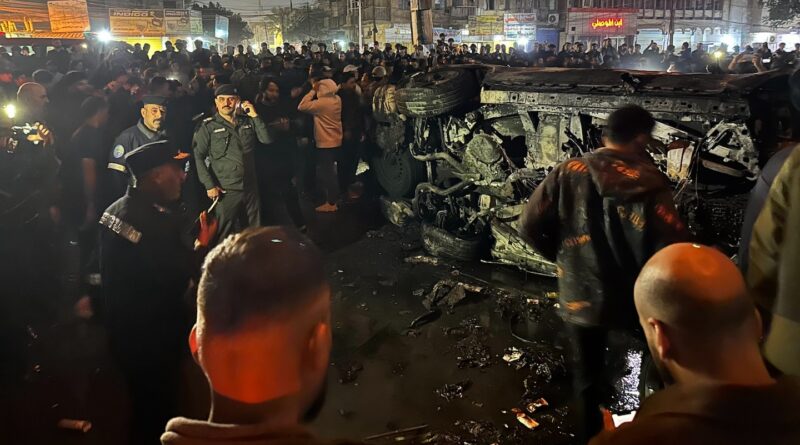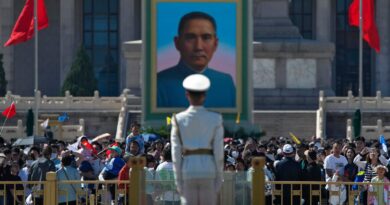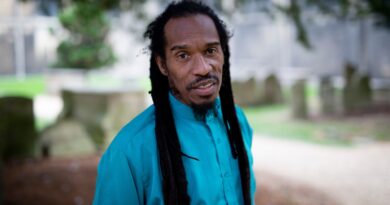U.S. strike in Baghdad kills key militia commander, officials say
U.S. military officials said the strike was carried out about 9:30 p.m. “in response to the attacks on U.S. service members” and resulted in the death of a militia commander “responsible for directly planning and participating” in those attacks. The statement, which does not identify the individual who was killed, said there were no initial indications of civilian casualties.
Iraq’s Popular Mobilization Forces, a group that includes Kata’ib Hezbollah, announced Wednesday the death of Abu Baqir Al Saedi, a senior leader affiliated with the militia. Kata’ib Hezbollah posted a picture of Saedi online along with images of a vehicle that was struck.
“We swear we won’t be silent,” text accompanying one image read. The group reiterated its demand for an end to the “U.S. occupation.” U.S. forces are in Iraq at the invitation of the Iraqi government, but the two governments began formal talks in January aimed at winding down the presence of U.S.-led coalition troops in the country.
Harakat Hezbollah al-Nujaba, a militia that has claimed several attacks on U.S. forces, called on the Iraqi government to act and vowed to retaliate. “This violation will not be the last if there is no strict and firm official position from the Iraqi government,” the group said. “These crimes will not go unpunished.”
Wednesday’s strike — on a busy shopping boulevard in the country’s capital — appeared certain to inflame ongoing tensions between the U.S. and Iraqi governments.
After the U.S. claimed responsibility for the killing, an Iraqi military spokesman called the strike “a clear aggression and violation of Iraqi sovereignty.” Iraq would “hold the American side and the coalition forces responsible for the repercussions of these dangerous actions that threaten the security and safety of the country,” the spokesman, Maj. Gen. Tahseen Al Khafaji, said in a statement.
The government of Prime Minister Mohammed Shia al-Sudani had condemned a previous round of U.S. strikes, on Feb. 2, targeting the militias that are part of Iraq’s security services. Sudani, who visited wounded militia members in the hospital, has also warned that Iraq should not serve as a stage for the conflict between Iran and the United States.
Militias organized under the Islamic Resistance in Iraq have framed their attacks on U.S. personnel as a protest of Israel’s military campaign in Gaza and American support for it. But leaders of Kata’ib Hezbollah pledged on Jan. 30 to suspend its attacks “in order prevent embarrassment of the Iraqi government.”
Loud booms were heard across the capital on Wednesday night. The Iraqi military later announced that a civilian car had been targeted in the Mashtal neighborhood in eastern Baghdad, killing all of its occupants. Crowds later gathered around the blackened vehicle, a Jeep, and at one point security officers removed a body from underneath the car.
Last week, U.S. forces struck 85 targets in Iraq and Syria, destroying or damaging virtually all of them, officials have said. The Iraqi government reported civilian casualties afterward and summoned a senior U.S. diplomat to issue an official note of protest. The Iraqi Foreign Ministry said that civilians were killed in the strikes and that Iraq does not want to be an arena “for settling scores between rival countries.”
Administration officials have said they will take all necessary measures to protect U.S. troops. On Sunday, National Security Council spokesman John Kirby implored the Iraqi government to “move with more alacrity” in addressing the threats posed to roughly 3,500 American military personnel who are based in the country and neighboring Syria.
“Three Americans were killed, three troops; three families now are grieving,” Kirby told Fox News, referencing the Jan. 28 attack in Jordan. “The president’s not going to sit back and idly just take that. We’re going to respond.”
Lamothe and Horton reported from Washington.




